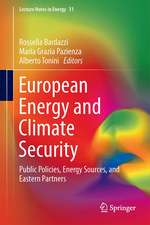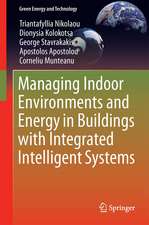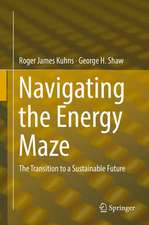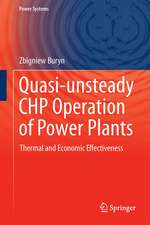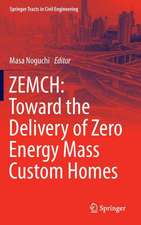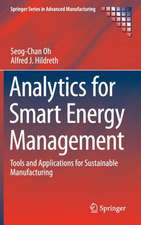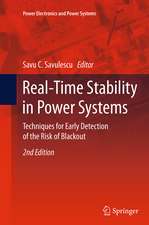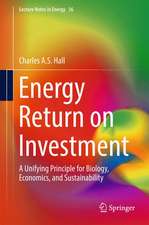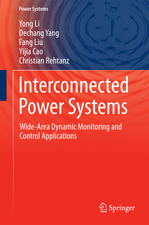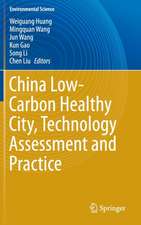Advanced Decision Making for HVAC Engineers: Creating Energy Efficient Smart Buildings
Autor Javad Khazaiien Limba Engleză Hardback – 18 aug 2016
| Toate formatele și edițiile | Preț | Express |
|---|---|---|
| Paperback (1) | 579.84 lei 6-8 săpt. | |
| Springer International Publishing – 23 iun 2018 | 579.84 lei 6-8 săpt. | |
| Hardback (1) | 642.51 lei 6-8 săpt. | |
| Springer International Publishing – 18 aug 2016 | 642.51 lei 6-8 săpt. |
Preț: 642.51 lei
Preț vechi: 755.88 lei
-15% Nou
Puncte Express: 964
Preț estimativ în valută:
122.96€ • 127.90$ • 101.51£
122.96€ • 127.90$ • 101.51£
Carte tipărită la comandă
Livrare economică 12-26 aprilie
Preluare comenzi: 021 569.72.76
Specificații
ISBN-13: 9783319333274
ISBN-10: 3319333275
Pagini: 163
Ilustrații: XVII, 191 p. 40 illus. in color.
Dimensiuni: 155 x 235 x 13 mm
Greutate: 0.48 kg
Ediția:1st ed. 2016
Editura: Springer International Publishing
Colecția Springer
Locul publicării:Cham, Switzerland
ISBN-10: 3319333275
Pagini: 163
Ilustrații: XVII, 191 p. 40 illus. in color.
Dimensiuni: 155 x 235 x 13 mm
Greutate: 0.48 kg
Ediția:1st ed. 2016
Editura: Springer International Publishing
Colecția Springer
Locul publicării:Cham, Switzerland
Cuprins
Introduction.- Heat Transfer in a Nutshell.- Load Calculation and Energy Modeling.- Data Centers.- Healthcare Facilities.- Laboratories.- Cleanrooms.- Commercial Kitchens and Dining Facilities.- Introduction.- Analytical Hierarchy Process.- Genetic Algorithm Optimization.- Pareto Base Optimization.- Decision making under uncertainty.- Agent Based Modeling.- Artificial Neural Network.- Fuzzy Logic.- Game Theory.- Buildings of the Future.
Notă biografică
Dr. Javad Khazaii earned his B.Sc. in Mechanical Engineering from Isfahan University of Technology, his Master of Business Administration with a concentration of Computer Information Systems from Georgia State University, and his PhD in Architecture with a major in building technology and a minor in building construction from Georgia Institute of Technology. He is a registered engineer and a LEED accredited professional with more than two decades of professional project management, design and energy modeling. He has been adjunct faculty in Engineering at Kennesaw State University since 2011. Dr. Khazaii has co-authored scientific articles and conference proceedings for the ASME and IBPSA, and he was one of the original contributors to the State of Qatar (Energy) Sustainability Assessment System (QSAS). His team was awarded first place in the International Building Performance Simulation Association's (IBPSA) annual group competition in 2009. His first book “Energy Efficient HVAC Design, An Essential Guide for Sustainable Building” was published by Springer in 2014 and is within Springer’s top 100 best sellers in Energy.
Textul de pe ultima copertă
This book focuses on some of the most energy-consuming HVAC systems; illuminating huge opportunities for energy savings in buildings that operate with these systems. The main discussion is on, cutting-edge decision making approaches, and algorithms in: decision making under uncertainty, genetic algorithms, fuzzy logic, artificial neural networks, agent based modeling, and game theory. These methods are applied to HVAC systems, in order to help designers select the best options among the many available pathways for designing and the building of HVAC systems and applications. The discussion further evolves to depict how the buildings of the future can incorporate these advanced decision-making algorithms to become autonomous and truly ‘smart’.
Caracteristici
Explains the principles of heat transfer, load calculations and energy modeling used for achieving energy efficient HVAC design solutions Highlights some of the highest energy-consuming HVAC applications and describes possible opportunities for tremendous energy savings Demonstrates cutting-edge methods and techniques to help HVAC designers in their decision making approach for selecting and improving appropriate systems and solutions Illustrates how buildings of the future can utilize these advanced decision making approaches to become autonomous and truly smart






